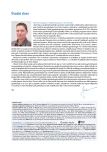-
Medical journals
- Career
Transfer-factor (IMUNOR) administration in women with chronic vulvovaginal discomfort: clinical study results
Authors: Vít Unzeitig 1,2; Jan Kestřánek 3; Jiří Špaček 3
Authors‘ workplace: Centrum ambulantní gynekologie a primární péče Brno 1; Gynekologicko-porodnická klinika MU a FN Brno 2; Gynekologicko-porodnická klinika UK a FN Hradec Králové 3
Published in: Prakt Gyn 2012; 16(1): 3-6
Category: Gynecology and Obstetrics
Overview
A study on the effect of administration of the transfer-factor (IMUNOR) on the changes in subjective complaints in women suffering from chronic vulvovaginal discomfort of unclear etiology. The patients themselves assessed their subjective complaints based on their intensity using a 0–10 scale rating system. 28 women at fertile age were included in the study. After the loading dose was administered, IMUNOR 10mg was taken on an empty stomach once a week for a period of 3 months.
Results:
46 % of the patients reported a significant improvement or even passing of their complaints (the score at the end of the study was lower by over 71 %), 33 % reported improvement (the final score decreased by 31–70 %) and only 21 % of the participants stated just a small or no improvement at all of their condition.Conclusion:
the administration of the IMUNOR 10mg transfer-factor led to the improvement in the chronic vulvovaginal discomfort in almost 80 % of the study participants.Key words:
IMUNOR – transfer-factor – vulvovaginal discomfort
Sources
1. Mardh PA, Rodrigues AG, Genc M et al. Facts and myths on recurrent vulvovaginal candidosis – a review on epidemiology, clinical manifestations, diagnosis, pathogenesis and therapy. [Review]. International Journal of STD & AIDS 2002; 13(8): 522–539.
2. Ledger WJ, Witkin SS. Vulvovaginal infections. London: Manson Publish 2007.
3. Witkin SS, Linhares IM, Giraldo P. Bacterial flora of the female genital tract: function and immune regulation. Best Pract Res Clin Obstet Gynaecol 2007, 21(3): 347–354.
4. Patel D, Gillespie B, Sobel J et al. Risk factors for recurrent vulvovaginal candidiasis in women receiving maintenance antifungal therapy: results of a prospective cohort study. Am J Obst Gynaecol 2004; 190(3): 644–653.
5. Falagas ME, Betsi GI, Athanasiou S. Probiotics for prevention of recurrent vulvovaginal candidiasis: a review. The Journal of Antimicrobial Chemotherapy 2006; 58(2): 166–174.
Labels
Paediatric gynaecology Gynaecology and obstetrics Reproduction medicine
Article was published inPractical Gynecology

2012 Issue 1-
All articles in this issue
- Transfer-factor (IMUNOR) administration in women with chronic vulvovaginal discomfort: clinical study results
- The effect of hyaluronate in gynaecology and obstetrics
- Use of phytoestrogens in gynaecology
- Anaphylaxis in pregnancy
- Mechanism of implantation of the embryo
- Menstrual migraine (migraine without aura): diagnostic and possibility of hormonal treatment
- News in postcoital contraception
- Histopathological classification of breast cancer in relation to the use the types of systemic treatment
- Cancer stem cells in ovarian cancer
- Paravaginal hematoma: case report
- Practical Gynecology
- Journal archive
- Current issue
- Online only
- About the journal
Most read in this issue- Mechanism of implantation of the embryo
- Paravaginal hematoma: case report
- Transfer-factor (IMUNOR) administration in women with chronic vulvovaginal discomfort: clinical study results
- Menstrual migraine (migraine without aura): diagnostic and possibility of hormonal treatment
Login#ADS_BOTTOM_SCRIPTS#Forgotten passwordEnter the email address that you registered with. We will send you instructions on how to set a new password.
- Career

